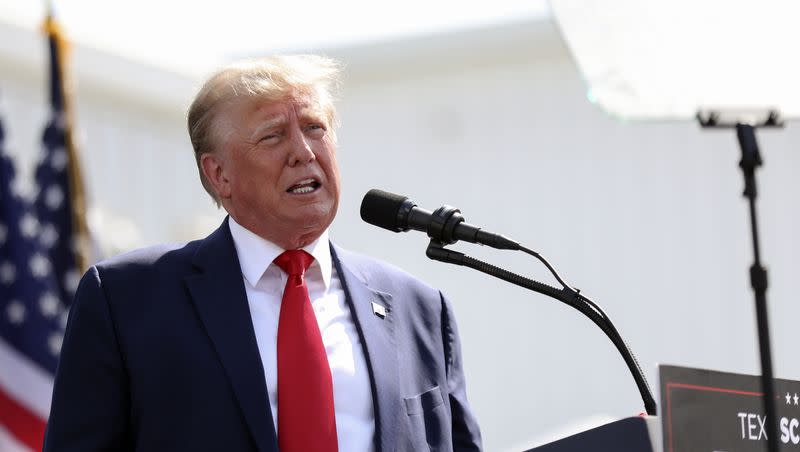The Trump fraud case, explained

- Oops!Something went wrong.Please try again later.
- Oops!Something went wrong.Please try again later.
A New York judge found the former president and his business associates liable for fraud on Tuesday, arguing that they “inflated the value of his properties and other assets.”
The Associated Press reported that in a civil lawsuit brought to Judge Arthur Engoron by New York Attorney General Letitia James, the ruling found that Trump’s company had “deceived banks, insurers and others” by not accurately valuing his assets and “exaggerating his net worth on paperwork used in making deals and securing loans.”
Related
Why is there another case against Trump? CNN reported that the lawsuit brought forward by James is seeking $250 million in damages, a ruling that cuts the Trumps off from being officers of a New York business and prevents the company from “engaging in business transactions for five years.”
“Today, a judge ruled in our favor and found that Donald Trump and the Trump Organization engaged in years of financial fraud,” James said in a statement regarding the ruling on Tuesday. “We look forward to presenting the rest of our case at trial.”
The Hill reported that Trump responded to the ruling, saying, “It is a terrible reminder that the radical left Democrats will stop at nothing in trying to prevent me, and the American people, from winning the 2024 presidential election.”
Trump continued, “Regardless of party, we can not let this happen in the United States of America.”
The trial will reportedly start next week with no real insight as to how this lawsuit will play out in the end.
“If the decision is upheld, they have to liquidate the LLC’s which actually hold the enormous bulk of the assets,” said Bill Black, the distinguished scholar in residence for financial regulation at the University of Minnesota Law School.
Related
What evidence was presented in the Trump fraud case? Court documents involved in the case said, “Following a comprehensive three-year investigation by the Office of the Attorney General, involving interviews with more than 65 witnesses and review of millions of pages of documents produced by Defendants and others,” the attorney general’s office found that Trump, along with some of his business associates, “engaged in numerous acts of fraud and misrepresentation in the preparation of Mr. Trump’s annual statements of financial condition covering at least the years 2011 through 2021.”
The first three “strategies” out of a total eight strategies listed as evidence in court documents were:
“Relying on objectively false numbers to calculate property values. For example, Mr. Trump’s own triplex apartment in Trump Tower was valued as being 30,000 square feet when it was 10,996 square feet. As a result, in 2015 the apartment was valued at $327 million in total, or $29,738 per square foot.”
“Ignoring legal restrictions on development rights and marketability that would materially decrease property values.” One of three pieces of evidence used to support this claim was, “In the 2012 Statement, rent stabilized apartments at Trump Park Avenue were valued as if they were unrestricted, leading to a nearly $50 million valuation for those units — but an appraisal accounting for those units’ stabilized status valued them collectively at just $750,000.”
“Failing to use basic rules of valuation to ensure reliable and accurate results — such as discounting revenue or cash flow that might be obtained from a speculative development far into the future to its present value.” The evidence linked to this claim was “a series of high-value properties estimated the profits from developing and selling homes without accounting for the years it would take to plan, build, and sell the homes and instead operated under the impossible and thus false premise that the homes could be planned, built, and sold instantaneously.”
In Trump’s response to the ruling, he said, “I am worth much more than the numbers shown on my financial statements. I didn’t even include my most valuable asset, my brand.”
“There were no victims,” Trump said.
Related
How many lawsuits has Donald Trump faced? Donald Trump has garnered a total of 4,095 lawsuits over the past three decades in various courts, according to the USA Today analysis of legal filings across the United States.
Along with these lawsuits, Trump is the only president to be impeached twice.
The former president reportedly plans to appeal the decision, according to The Associated Press.
“It is a great company that has been slandered and maligned by this politically motivated witch hunt,” Trump wrote, according to The Hill. “It is unfair, and I call for help from the highest court in New York State, or the federal system, to intercede. THIS IS NOT AMERICA!”

